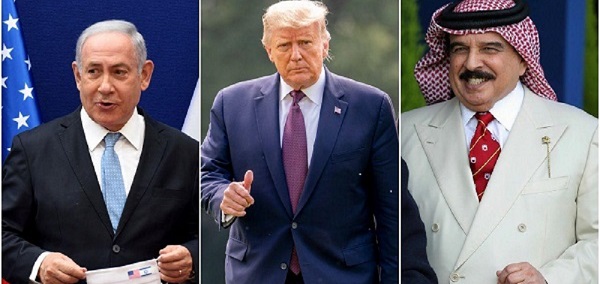Alwaght- While made a mocking and joking subject by social media users for his candidacy for Nobel Peace Prize for brokering the so-called Emirati-Israeli peace deal, the US President Donald Trump on Saturday announced that Bahrain has followed in the UAE’s footsteps by agreeing to normalize ties with Tel Aviv.
The announcement, however, was not as surprising as the thaw Abu Dhabi entered with the Israeli regime in mid-August and it was quite predictable that Manama rulers will be next in the line to normalize ties with the Israelis. When the UAE announced the normalization, the Bahraini King Hamad bin Isa Al Khalifa was among the small number of leaders who in a phoebe call to the UAE Crown Prince Mohammed bin Zayed called the deal “historic.”
Shortly later, Israeli media said that Bahrain was the likeliest state to join the UAE in normalization because naturally it hosted the “deal of the century” summit in late June and also it, rightly said, has the least foreign policy independence among the Persian Gulf Arab states. Despite all these, Al Khalifa seem to have their own goals behind this move which is widely condemned by the Muslim Public opinion.
Continuing blame-shifting policy
Dependence on foreign powers while at the same time suffering from lack of home legitimacy is one of the most fundamental factors motivating Bahrain’s despotic ruler to seek close ties with the aligned regional and international powers and stand submissive to their policies.
As a matter of fact, the political structure in the petite island monarchy may be constitutional on the paper, but the power is concentrated in the hands of the ruling Al Khalifa family. The tightly closed political regime in the country prevents Shiites, who are majority there, from participating in power structure. Since 2011 that the Arab uprisings wave also swept through the tiny monarchy, the ruling family suppressed the pro-democratic and anti-discrimination revolution of the Bahraini people with direct military intervention of the Saudi forces and green light of its Western patrons especially the US.
Meanwhile, to evade answering to the home and international outcry amid ongoing suppression, Al Khalifa resorted to blame-shifting paths, among them attributing the protests to foreign incitement and meddling and also charging the peaceful demonstrators and activists with terrorist actions in military courts with largely extrajudicial and heavy verdicts like execution, life sentences, and citizenship revocation.
The continuation of this police pushed the Western-dominated rights groups to protest. Even the European countries several times released statements in condemnation of the execution rulings for political prisoners.
Assuming that siding with normalization— for its acceptability among the Western governments— can bring back part of the lost favor of the West to Manama regime and ease the pressures put on it because of showing iron fist to the peaceful protests, Bahrain rulers frantically joined the normalization trend.
From now on, the pro-justice and discrimination protests will be reduced by regime to protests against normalization. This will provide new propaganda feeds for the Western and Arab media covering the Bahraini developments.
Also economy is one aspect in Bahrain’s step towards normalization. The country’s economic challenges amid oil prices slump and the government’s deficiency in addressing the economic crisis without foreign aids push Manama regime to choose the challenge-filled path of normalization to have high hopes of reaching economic prosperity on the strength of economic support promised by the UAE, Saudi Arabia, the US, and even Israeli regime.
Reports suggest that over the past two years, national debts have reached catastrophic levels, as the budget deficit and debt interests equaled half of national budget. Its national debt is now $40 billion and poised to reach $50 billion soon. The debt interests, figures show, reach half a billion dollar annually.
To cover up the negative effects of the economic crisis, Al Khalifa regime since June 2015 halted publishing official economic statistics. It stops short of very limited and general amount of data on the economic conditions.
Adventuring by Trump and bin Salman’s false promises
Certainly, the thaw with Tel Aviv deals another blow to the already-delicate strings of relations between the regime and the public whose majority is Shiite. In other words, though the leaders have made the strategic mistake of normalization with the Israelis with optimism caused by aid promises by the Saudis and the Americans, the past Arab experiences, like Yemen, Algeria, Tunisia, and even Egypt under Hosni Mubarak, prove that maintaining a suppressive policy with foreign backing cannot save the dictatorships, and to its frustration, by normalizing ties with Tel Aviv, Manama regime only unleashed new home and even foreign challenges to itself.



























